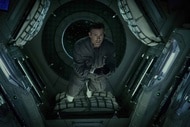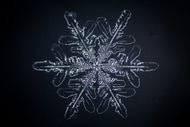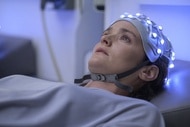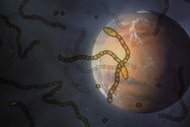Create a free profile to get unlimited access to exclusive videos, sweepstakes, and more!
Yes, Japan just bombed an asteroid

You could call it revenge for the asteroid that obliterated the dinosaurs. Sort of.
Eyes on Earth have been impatiently watching Japan’s Hayabusa2 spacecraft for that moment when it would smash the asteroid Ryugu in the face—but for science, not vengeance. JAXA finally did it last night, by shooting a projectile through the darkness to blast a crater into the 3,000-foot-wide piece of space rock. Why? So it can be studied further, of course.
When most people on this side of the planet were going to bed or watching late-night TV at around 10:00 p.m. ET, Hayabusa’s Small Carry-on Impactor (SCI) operation was getting ready to throw a cosmic punch. The Hayabusa2 mothership deployed a 4.4-pound copper plate backed by serious explosives. 40 minutes later, the explosives detonated, firing the projectile at 4,500 mph. You can probably imagine what happened next.
Hayabusa2 was right on. The mothership needed to take cover behind Ryugu to avoid getting bombarded by the inevitable shower of debris, so it used its DCAM3 camera to image the explosion. DCAM3 captured a shot of the impact and blew minds all over Earth with it.
"After the start of the operation, the camera [that] separated from Hayabusa2 captured an image that shows ejection from Ryugu’s surface, which implies that the SCI had functioned as planned," Japan Aerospace Exploration Agency (JAXA) officials said.
While Hayabusa2 had already picked up a sample from the asteroid in February, when the mothership pulled off a brief touchdown, it may grab another one from the artificial crater if there is a piece of debris big enough floating around. The previous sample will land on Earth in 2020 in a special return capsule. If the spacecraft manages to snatch another one, it will probably follow suit, though JAXA has no word on that yet.
Even if it is unable to get more asteroid stuff to send back to the home planet, Hayabusa2 will still be keeping a robotic eye on Ryugu from a distance and studying its newly exposed innards. The sample that reaches human hands could tell us more about the birth of the solar system and even the emergence of life on Earth. Asteroids are thought to have brought water and organic molecules to our nascent planet.
This mission will only add to the data Hayabusa2 has gathered so far. The spacecraft has already landed two hopping rovers and a larger 22-pound lander on the asteroid, and still has one more hopper it might be sending over this summer.
By the way, another asteroid is about to get punched soon (if you call 2022 soon), this time by NASA. Sci-fi movies couldn’t do this better.
(via Space.com)



























